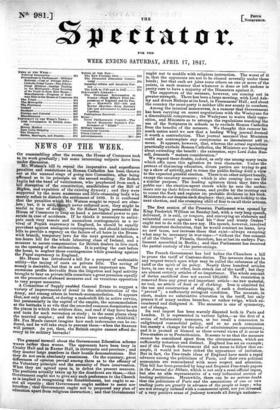NEWS OF THE WEEK.
ON reassembling after the recess, the House of Commons took to its work gradually ; but some interesting subjects have been under discussion.
Mr. Watson's bill to repeal the inoperative and superfluous penalties and restrictions on Roman Catholics has been thrown out at the unusual stage of going into Committee, after being affirmed as to its principle on the second reading. Sir Robert Inglis led the band of vaticinators, who prophesied from such a bill disruption of the constitution, annihilation of the Bill of Rights, and expulsion of the existing dynasty ; and they were supported by the more numerous and little-reasoning body who merely refuse to disturb the settlement of l89.9. It is confessed that the penalties which Mr. Watson sought to repeal are obso- lete; but, it is said,,Ikaugh never enforced now, they might be useful in time of danger. So Sir Robert Inglis persuaded the House of Commons to keep on band a provisional power to per- secute in case of accidents. If he thinks it necessary to antici- pate such very remote and anomalous contingencies as a re- vival of Popish supremacy in England, he should be equally provident against analogous contingencies, and should introduce bills to provide a regency on the failure of all heirs in the Bruns- wick branch, temporary laws for the next general rebellion, a ten-hours bill for the whole labouring class of Ireland, and a measure to secure compensation fur British dealers in live stock on the opening of the millennium. It is putting the cart before the horse, to neglect those contingencies while guarding against the Papal supremacy in England. Mr. Hume has introduced a bill for a purpose of undeniable utility—the taxing of costs on private bills. The saving of money is desirable, but that is not its most important use. The enormous profits derivable from the litigation and legal activity brought to bear on private bills constitute a great premium equally on the promotion of absurd measures and on vexatious opposition to very proper measures. A Committee of Supply enabled General Evans to suggest a variety of improvements of detail in the administration of the Army, and among others in barrack-accommodation. It appears that, not only abroad, or during a makeshift life in active service, but permanently in the capital of the empire, the accommodation at the barracks is so vile that the crowded common dormitories are the places in which the soldiers dine and read if they have books and taste for such recreation or study ; in the same places sleep the married couples ; and the wives there undergo childbirth ! Mr. Fox Maule cannot imagine how such indecencies can be en- dured, and he will take steps to prevent them—when the finances will permit. As yet, then, the British empire cannot afford de- cency in its military barracks!


























